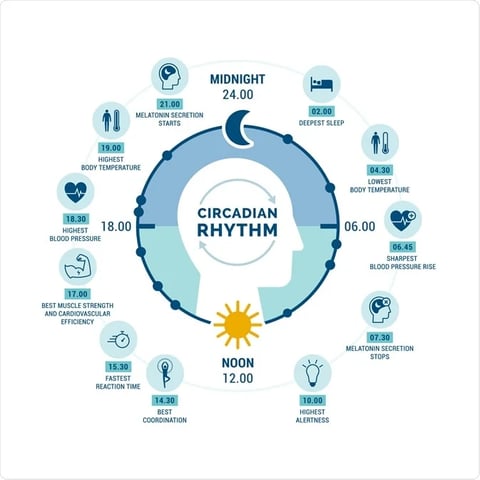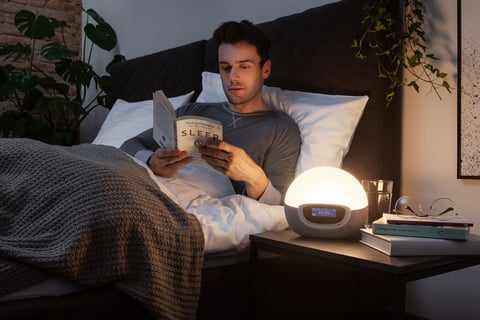
Sleep Conditioning: A Comprehensive Guide to Better Sleep
Sleep conditioning is a systematic approach to improving sleep quality and establishing healthy sleep patterns through behavioral modification and environmental optimization. This comprehensive guide will help you understand and implement effective sleep conditioning techniques.


In a world that never sleeps, where screens buzz with notifications and deadlines loom like shadows, the quest for restorative slumber often feels more elusive than ever. Yet, what if we told you that the key to unlocking your best sleep lies not in counting sheep or investing in pricey gadgets, but rather in mastering the art of Sleep Conditioning? This comprehensive guide embarks on a journey through the transformative landscape of sleep training and behavioral sleep modification, offering practical strategies to help you cultivate better sleep habits and optimize your unique sleep patterns.
Imagine drifting off each night with ease—your body rhythmically synchronized to nature's lullaby. As we delve into the intricacies of Sleep Conditioning, you'll discover how small adjustments can lead to profound changes in your nightly routine. From understanding the science behind circadian rhythms to uncovering techniques for effective sleep habits development, this guide is designed not just to inform but also to empower. Whether you're a restless night owl or a chronic insomniac seeking relief, join us as we explore actionable methods for reclaiming those precious hours of rest and rejuvenation.
What is Sleep Conditioning?
Sleep conditioning refers to the process of training your body and mind to maintain consistent, healthy sleep patterns. In our fast-paced world, achieving quality sleep has become a challenge for many, but sleep conditioning offers a compelling solution. By incorporating various techniques and strategies, you can effectively regulate your circadian rhythm and enhance your overall sleep quality.
Imagine waking up every morning feeling refreshed and energized—this is the power of sleep conditioning. It involves simple yet effective practices such as establishing a regular bedtime routine, creating a restful environment, and minimizing exposure to screens before bed. These strategies work together to signal to your brain that it's time to wind down, helping you fall asleep faster and stay asleep longer.
Moreover, consistent sleep patterns can lead to significant improvements in mood, cognitive function, and even physical health. By prioritizing sleep conditioning in your daily routine, you're investing in better mental clarity and emotional stability.
Don't underestimate the transformative potential of adopting these practices. Start today by making small adjustments that align with the principles of sleep conditioning—your future self will thank you for it!
How Your Body Gets Conditioned for Better Sleep
Understanding the science behind sleep conditioning reveals why it's such a powerful tool for enhancing sleep quality. At the heart of this process is our body's natural circadian rhythm, an internal biological clock that regulates our sleep-wake cycle. By aligning with this rhythm through consistent practices and environmental cues, we can significantly improve our sleep experience.
Sleep conditioning works by creating a harmonious relationship between our daily routines and our circadian rhythm. This involves setting regular sleep and wake times, which helps signal to your body when it's time to wind down or wake up. Additionally, exposure to natural light during the day and minimizing artificial light at night play crucial roles in reinforcing these signals.
Environmental factors also contribute to effective sleep conditioning. A cool, dark, and quiet bedroom environment supports the body's transition into restful slumber. Incorporating calming pre-sleep rituals like reading or meditating further enhances this process by reducing stress levels and signaling relaxation.
By leveraging these strategies, we can optimize our natural biological systems for better rest. Embracing the principles of sleep conditioning not only enhances nightly rest but also boosts overall health and well-being, making it an essential practice for anyone seeking improved life quality through better sleep.
Key Benefits of Sleep Conditioning
Sleep conditioning is a powerful tool that goes beyond simply counting sheep; it transforms your relationship with sleep into one of rejuvenation and strength. By practicing techniques such as sleep hygiene, mindfulness meditation, and consistent sleep scheduling, individuals often experience improved sleep quality and duration. This deeper, more restorative rest amplifies bodily functions significantly, leading to enhanced daytime alertness and productivity. Imagine tackling work tasks with a clear mind and boundless energy—this is the potential unlocked through well-conditioned slumber.
Moreover, the psychological benefits are profound; better emotional regulation and stress management emerge naturally from consistent quality sleep. Those who regularly engage in effective sleep habits find themselves equipped to navigate life’s challenges with increased resilience. As we prioritize our rest, we also bolster our immune system function—sleep acts as a vital ally in maintaining our health defenses against illnesses.
Ultimately, embracing these practices promotes not just individual productivity but contributes to increased overall well-being and mental health, resulting in a more fulfilled life. By investing in your sleep conditioning routine today, you pave the way for a brighter tomorrow filled with vitality and balance.
Essential Sleep Conditioning Techniques
1. Establish a Consistent Sleep Schedule - Build a Consistent Sleep Routine
Establishing a consistent sleep schedule is crucial for maintaining optimal health and well-being. By going to bed and waking up at the same time every day, even on weekends, you can significantly improve the quality of your sleep. This practice helps regulate your body's internal clock, also known as the circadian rhythm, which plays a vital role in determining when you feel alert or sleepy.
Consistent sleep patterns ensure that your body gets accustomed to a regular routine, making it easier to fall asleep and wake up naturally without relying on alarms or feeling groggy. Moreover, by aligning your sleep schedule with your body's natural rhythms, you'll likely experience more restorative sleep cycles that enhance memory consolidation, mood regulation, and overall cognitive function.
While it might be tempting to stay up late or sleep in during weekends, these irregularities can disrupt your internal clock and lead to what experts call "social jetlag". To avoid this and reap the benefits of consistent restfulness throughout the week, commit to maintaining regular bedtimes and wake times. Your body will thank you for it with increased energy levels and improved mental clarity.
2. Create an Optimal Sleep Environment
Creating an optimal sleep environment is crucial for achieving restful and rejuvenating sleep. To start, ensure your bedroom is dark, quiet, and cool. Darkness signals to your body that it's time to wind down, making blackout curtains or a quality sleep mask invaluable investments. A quiet space minimizes disruptions, so consider using earplugs or a white noise machine if necessary.
Temperature also plays a significant role; keeping your room cool helps regulate your body’s natural temperature drop during sleep. Aim for a setting around 60-67 degrees Fahrenheit for the best results.
Comfortable bedding can make all the difference in how well you rest. Choose sheets and pillows that suit your personal comfort preferences—whether you prefer the softness of cotton or the luxury of silk—ensuring they provide adequate support and coziness.
Finally, minimize electronic distractions by removing TVs and smartphones from the bedroom. The blue light emitted by screens can interfere with melatonin production, disrupting your natural sleep cycle. Instead, create a bedtime ritual that promotes relaxation without digital interference.
By optimizing these elements of your sleeping environment, you're not just improving how quickly you fall asleep but also enhancing the overall quality of your rest—a vital step toward better health and well-being.
3. Develop a Relaxing Bedtime Routine
Creating a relaxing bedtime routine is essential for signaling to your body that it's time to wind down and prepare for a restful night's sleep. By implementing calming activities like reading, gentle stretching, or meditation before bed, you can significantly enhance the quality of your sleep and overall well-being.
Reading a book allows your mind to escape the stresses of the day and immerse itself in another world. This mental shift can help reduce anxiety and promote relaxation. Choose a book that soothes rather than stimulates—perhaps something light-hearted or inspirational—to ease you into slumber.
Gentle stretching before bed not only helps release tension accumulated throughout the day but also signals your muscles to relax. Incorporating simple stretches into your routine can improve circulation and flexibility, making it easier for your body to transition into rest mode.
Meditation is another powerful tool in preparing for sleep. Even just a few minutes of focused breathing or guided meditation can calm an overactive mind, reduce stress levels, and create a sense of peace. This practice encourages mindfulness, allowing you to let go of daily worries as you drift off.
By consistently engaging in these calming activities each night, you're essentially training your body to recognize these cues as indicators that it's time for sleep. Over time, this routine will become second nature, helping you fall asleep more quickly and enjoy deeper rest. Embrace this opportunity to nurture yourself with tranquility at the end of each day—you deserve it!
Frequently Asked Questions (FAQs)
Q: How long does it take to see results from sleep conditioning?
A: Most people begin to notice improvements within 2-3 weeks of consistent practice. However, individual results may vary depending on current sleep patterns and commitment to the process.
Q: Can sleep conditioning help with insomnia?
A: Yes, sleep conditioning techniques are often recommended as part of insomnia treatment. They help address behavioral and environmental factors that contribute to sleep difficulties.
Q: Is it necessary to use sleep tracking devices?
A: Sleep tracking devices, while not essential for sleep conditioning, can offer useful data about your sleep patterns and help track your progress in developing better sleep habits. Nevertheless, you can still achieve effective sleep condition and improve your sleep quality without using these devices.
Q: What should I do if my sleep schedule gets disrupted?
A:Return to your regular sleep routine as soon as possible. Avoid compensating with long naps or sleeping in, as this can further disrupt your sleep pattern.
Q: Will sleep training harm my baby?
A: No, when done correctly, sleep training does not harm babies. Research has shown that gentle sleep training methods are safe and can actually benefit both babies and parents. The key is to choose an age-appropriate method (typically after 4-6 months) and implement it consistently and lovingly.
Studies have found no negative effects on infant attachment, emotional development, or stress levels when using proper sleep training techniques. In fact, well-rested babies often show improved mood, better cognitive development, and stronger immune systems.
Sleep Training Challenges and Solutions
Challenge 1: Difficulty Maintaining Consistency
Maintaining consistency can often feel like an uphill battle, but overcoming this challenge is entirely within reach. The key lies in adopting a strategy that focuses on incremental changes. Start by implementing small adjustments to your routine, which can gradually lead you to your ideal schedule. This approach not only makes the process less daunting but also allows you to build sustainable habits over time.
To ensure these changes stick, it's crucial to utilize reminders effectively. Whether through digital alerts or old-fashioned sticky notes, having regular prompts can help keep your goals at the forefront of your mind. Additionally, tracking your progress plays a significant role in maintaining motivation. By documenting each step forward, you'll have tangible evidence of your achievements and growth, which serves as a powerful motivator.
Remember, consistency is not about perfection; it's about making steady progress toward your objectives. With patience and persistence—along with these practical solutions—you'll find yourself steadily moving towards a more consistent and fulfilling routine.
Challenge 2: Environmental Disruptions
In our fast-paced world, environmental disruptions can significantly impact the quality of your sleep, leading to a cascade of negative effects on your health and productivity. But there's a straightforward solution: investing in tools that help mitigate these disturbances. Blackout curtains, for example, are an excellent investment to block out intrusive light, creating a dark sanctuary conducive to restful slumber. Similarly, white noise machines can mask disruptive sounds from traffic or neighbors, enveloping you in a soothing auditory cocoon that promotes uninterrupted sleep. For those who prefer simplicity and portability, earplugs offer an effective barrier against noise pollution.
By equipping yourself with these tools—blackout curtains to shield you from light pollution and white noise machines or earplugs to combat sound interference—you can transform your bedroom into an optimal sleep environment. This small investment yields significant returns: improved mood, enhanced concentration, and increased resilience against daily stressors. Don't let environmental disruptions dictate the quality of your rest; take control and invest in creating the perfect sleep haven today.
Expert Tips for Success
Achieving success often requires a sharp mind and well-rested body, and one of the most effective ways to ensure both is by practicing good sleep hygiene. By implementing expert tips into your nightly routine, you can enhance your productivity and overall well-being.
Start by limiting screen time before bed. The blue light emitted from phones, tablets, and computers can interfere with your body's natural sleep cycle. Instead of scrolling through social media or checking emails late at night, consider winding down with a book or some gentle stretching exercises. This simple change can significantly improve the quality of your sleep.
Another crucial factor is to avoid caffeine and heavy meals close to bedtime. Caffeine stimulates the nervous system, making it difficult to relax into a restful state. Similarly, consuming large meals late in the evening can lead to discomfort or indigestion that disrupts sleep. Opt for lighter snacks if you're hungry before bed, ensuring they won't hinder your rest.
Regular exercise is also paramount for maintaining healthy sleep patterns; however, it's important not to engage in vigorous workouts too close to bedtime. Aim for physical activity earlier in the day so that your body has ample time to wind down afterward.
Finally, create a comfortable and dedicated sleep space that promotes relaxation and tranquility. Invest in quality bedding, control room temperature for comfort, and eliminate distractions like excessive noise or light pollution.
By incorporating these expert-backed strategies into your daily life, you'll set yourself up for success with rejuvenating nights of sleep that empower you both physically and mentally during waking hours.
Remember: Sleep conditioning is a gradual process that requires patience and consistency. Focus on progress rather than perfection, and adjust techniques as needed to find what works best for you.
Measuring Success
When it comes to improving your sleep, merely hoping for better rest isn't enough—you need a reliable way to measure your progress. By tracking key indicators, you can gain valuable insights into your sleep patterns and make informed adjustments to enhance your overall well-being. Here’s why you should focus on these essential metrics:
First, consider the time it takes to fall asleep. This is a crucial indicator of how relaxed and ready for rest you are at bedtime. If you're consistently taking too long to drift off, it might be time to reassess your evening routine or stress levels.
Next, keep an eye on the number of night-time awakenings. Frequent disruptions can severely impact the restorative quality of your sleep. Identifying patterns here can help pinpoint potential disturbances—whether they're environmental factors or lifestyle choices—that need addressing.
Morning alertness levels are another vital signpost on the road to better sleep health. Waking up refreshed and ready for the day suggests that you're achieving deep, restful slumber through the night.
Don’t forget about overall sleep quality, which encompasses all aspects of your nightly rest—from duration to depth and continuity. Monitoring this holistic measure will give you a comprehensive view of how well you're sleeping over time.
Finally, assess your daytime energy levels as they directly reflect the effectiveness of your nighttime rest. Persistent fatigue despite adequate hours in bed could indicate underlying issues with sleep quality that require attention.
By diligently tracking these indicators, you'll not only monitor progress but also empower yourself with actionable data that can lead to meaningful improvements in both sleep and daily life performance.
Additional Resources
For more information and support, consider:
- Consulting with a sleep specialist
- Joining sleep support groups
- Using sleep tracking apps
- Reading scientific literature on sleep hygiene
By following these guidelines and maintaining consistency, you can successfully condition your body for better sleep and improve your overall quality of life.




















Discover tips for sleep, detox, and mindfulness.
© 2024. All rights reserved.
